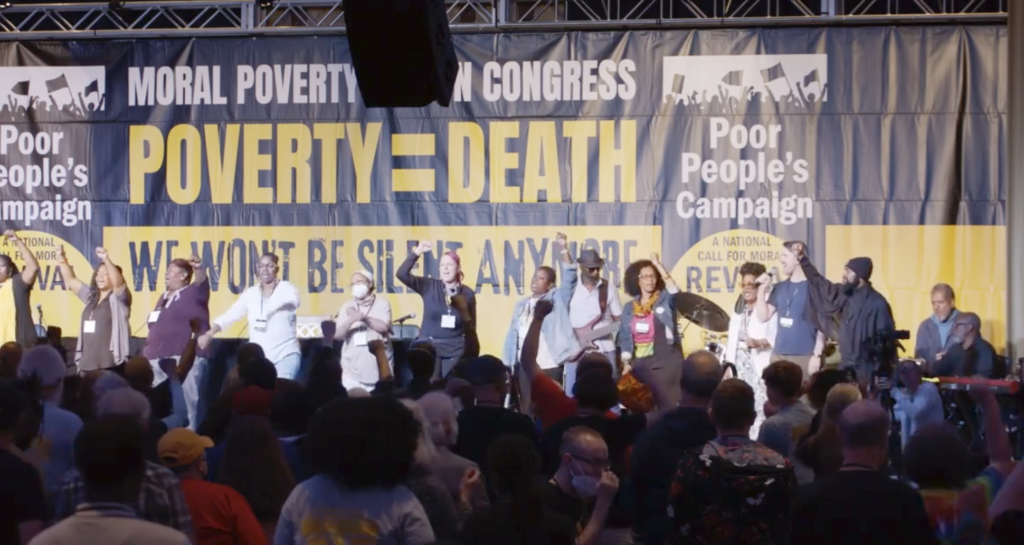
Editor’s note: The three-day Poor People’s Moral Action Congress that began on June 19, will sound the alarm on the crisis of poverty, bringing together poor and low-wealth people and faith leaders from across the country to strategize and demand that addressing poverty be on the nation’s agenda heading into the 2024 elections.
Bishop William J. Barber II, co-chair of the Poor People’s Campaign, featured in the opening session, says, “Today, poverty is the 4th leading cause of death nationwide. It is a death sentence for Americans. It is a moral travesty and a detriment to the soul of our nation . . . there’s not a scarcity of resources, but a scarcity of political will . . . we cannot be silent.”
Liz Theoharis, Poor People’s Campaign Co-chair, closed out the morning session on June 19 calling on people to hold on and fight on, adding that those in power who are profiting off the pandemic, low wages, those who are making a killing off of poverty, are very scared about people coming together to work together to end poverty. See video link below of the first morning of the Congress at https://www.poorpeoplescampaign.org/livestream/.
On Tuesday, according to organizers, members of the Poor People’s Campaign are planning to visit House and Senate lawmakers to urge them to take action to slash poverty, which impacts tens of millions of people in the U.S, reports Common Dreams at https://www.commondreams.org/news/poor-peoples-campaign-policy-murder/
Participants to lead funeral procession to Capitol, honor loved ones lost to poverty
Press Release:
The three-day Poor People’s Campaign Moral Poverty Action Congress will sound the alarm on the crisis of poverty, and bring together poor and low-wealth people and faith leaders from across the country to strategize and demand that addressing poverty be on the nation’s agenda heading into the 2024 elections. Participants will also demand the White House meet with poor and low-wealth workers, religious leaders, economists and lawyers with their moral movement to discuss how our nation’s leaders can address the crisis of death by poverty.
It comes as hundreds of thousands of Americans are being kicked off of Medicaid, child poverty is on the rise after the expanded child tax credit was allowed to expire, and as we near the 14th year since the impossibly low federal minimum wage of $7.25/hour was increased. And it follows a manufactured debt ceiling crisis that was resolved on the backs of poor people.
WHO: Bishop William Barber, Yale School of Public Health Assistant Professor Greg Gonsalves and UC-Riverside Professor David Brady, Economic Policy Institute Director of Race, Ethnicity and Economy Valerie Wilson, Hundreds of Poor People’s Campaign Leaders from 30+ States
WHAT: Poverty Kills: The Moral Mandate for Ending Poverty in America
A roundtable conversation hosted by the Yale Center for Public Theology and Public Policy at the 2023 Poor People’s Campaign Moral Action Congress
WHEN: June 19, 2023
WHERE: Washington DC Hilton, 1919 Connecticut Ave. NW, International Ballroom
“Today, poverty is the 4th leading cause of death nationwide. It is a death sentence for Americans. It is a moral travesty and a detriment to the soul of our nation that poverty kills more people than homicide yet the powers that be don’t want to address it,” said Bishop William J. Barber II, co-chair of the Poor People’s Campaign. “There’s not a scarcity of resources, but a scarcity of political will. Until our nation’s leaders invest the great riches of this nation in ensuring equal justice for all, beginning with the poor and low-wealth of this nation, we cannot be silent.”
FOURTH LEADING CAUSE OF DEATHThe Congress opened June 19 with a launch event hosted by the Yale Center for Public Policy and Public Theology featuring Bishop William J. Barber II, co-chair of the Poor People’s Campaign, leading a discussion with Yale School of Public Health Assistant Professor Greg Gonsalves, UC-Riverside Professor David Brady, the author of a recent report citing poverty as the fourth leading cause of death in America, and Valerie Wilson from the Economic Policy Institute. Click here to read more.

